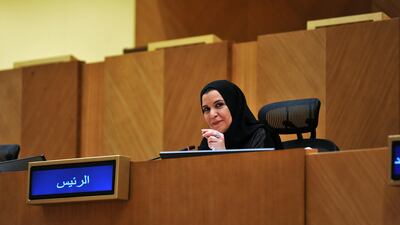The UAE has a track record of plugging any gaps that may open up between development, inclusion and advancement - from proposing longer maternity leave to giving sons of Emirati mothers citizenship, the Federal National Council has listened to and addressed those voices calling for the advancement of women's affairs.
As The National recently reported, the Arab League's women's affairs director recently said that the UAE is a role model for the effective integration of women in political systems thanks, in large part, to the efforts of Sheikha Fatima bint Mubarak, president of the Supreme Council for Motherhood and Childhood.
On the occasion of last year's Emirati Women's Day, Sheikh Mohammed bin Rashid, Vice President and Ruler of Dubai, declared that Emirati women made up two-thirds of government employees and university graduates and a third of the Cabinet. Eight of the UAE's 29 ministerial portfolios are held by women and yesterday's report on education found that three federal institutions of higher learning have mostly women enrolled.
_____________________
Read more
Emirati Women's Day: lawyer told women 'too emotional' for legal profession
Emirati Women's Day: chemical engineer 'an inspiration' to others as she takes on molten metals
Emirati Women's Day: Women of the FNC tell of their proudest moments
_____________________
Still, despite the integration of women in decision-making processes and government advisory council positions, ensuring proportionate representation in the workplace has not been without challenges. As The National also reported yesterday, the country needs the help of employers to encourage more Emirati women to take on roles in predominantly male industries, such as in the legal and engineering fields. Calls for determining male-female ratios and communicating these results are but a few tangible steps in this direction that must be heeded openly and systematically.
World opinion of women's rights in the Middle East remains poor and the region has not been able to shake off this stereotype save a few exceptions. In the modern age, the UAE is one of them. This is reflected, first and foremost, by the number of women who come from abroad to work across all domains, thanks to the country's opportunities and expansive policies. In the political sphere, less than two years ago, Dr Amal Al Qubaisi, who was elected Speaker of the Federal National Council (FNC), became the first woman to head a parliamentary institution in the region.
Indeed, any nascent economy should take note of the link between economic perseverance and inclusiveness. In that light, the mere introduction of a day each year to mark the nation’s women is as loud a statement as the calls that are continually being made for their empowerment.

